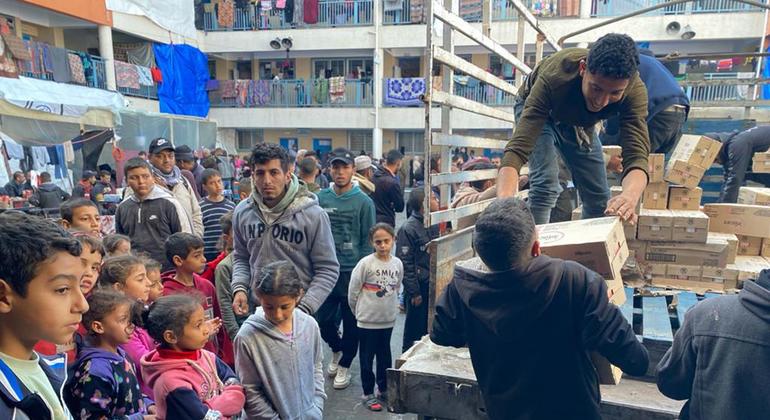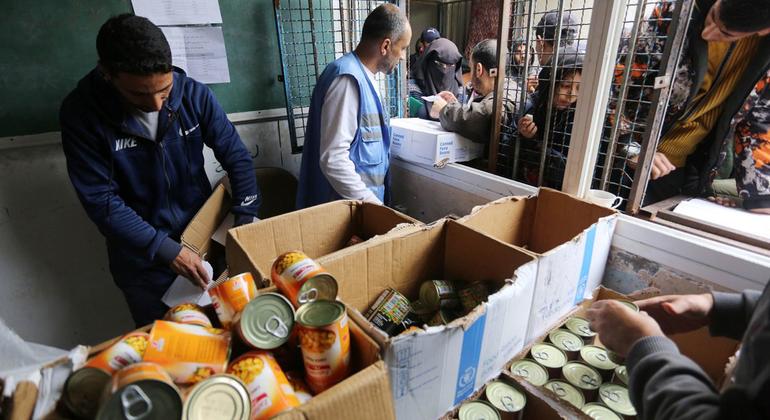“I am appalled by the recurrent mass abductions of men, women and children in northern Nigeria. Children have been abducted from schools and women taken while searching for firewood. Such horrors must not become normalised,” he said.
News reports indicate at least 564 people have been abducted since 7 March. More than 280 pupils were abducted that day from a school in Kuriga town in Kaduna State.
At least 200 others, mostly internally displaced women and children, were also abducted on 7 March in Gamboru Ngala in Borno state while reportedly searching for firewood.
Two days later, gunmen stormed a boarding school in Gidan Bakuso village in Sokoto state and abducted at least 15 pupils. On 12 March, about 69 people were abducted in two raids on a village in the Kajuru area of Kaduna state.
Justice must be done
“I acknowledge the Nigerian authorities’ announcement that they are taking action to safely locate the missing children and reunite them with their families,” said the UN rights chief.
“I urge them to also ensure prompt, thorough and impartial investigations into the abductions and to bring those responsible to justice.”
He called for perpetrators to be identified and brought to account – in compliance with international human rights law – “as a first step towards reining in the impunity that feeds these attacks and abductions”.
Sudan: Hunger ‘pervasive’ in Khartoum streets, warns UNICEF
Hunger across Sudan is on the rise, especially in the capital Khartoum, due to a near year-long war between rival generals that sparked a spiralling humanitarian crisis.
In a new alert, the UN Children’s Fund (UNICEF) said that hunger and unaffordable food are now the main worry for desperate civilians.
© UNICEF/Ahmed Elfatih Mohamdee
A child flees from Wad Madani, Al Jazirah state east-central Sudan following recent armed clashes there.
Jill Lawler, UNICEF’s chief of field operations and emergency in Sudan, described to journalists in Geneva on Friday what she had seen in Omdurman just outside Khartoum, where she led the first UN mission to the Sudanese capital since war erupted in April last year.
“Hunger is pervasive; it is the number one concern people expressed,” she said.
“We met one young mother at a hospital whose three-month-old little child was extremely sick because she couldn’t afford milk, so had substituted goat milk, which led to diarrheal conditions. She wasn’t the only one.”
Ms. Lawler said the numbers of acutely malnourished children are rising, and the lean season hasn’t even begun.
She cited worrying projections that nearly 3.7 million children could be acutely malnourished this year in Sudan, including 730,000 who need lifesaving treatment.
The senior UNICEF officer also described how women and girls who had been raped in the first months of war were now delivering babies. Some had been abandoned to the care of hospital staff, who had built a nursery near the delivery ward, she said.
Around 7.5 million children need aid in Syria
After thirteen years of conflict in Syria, almost 7.5 million children in the country are in need of humanitarian assistance – more than at any other time during the conflict, said UNICEF on Friday.
Repeated cycles of violence and displacement, a crushing economic crisis, extreme deprivation, disease outbreaks and last year’s devastating earthquakes have left hundreds of thousands of children exposed to long-term health issues.
More than 650,000 under-fives are chronically malnourished, representing an increase of around 150,000 recorded four years ago.
According to a recent household survey conducted in northern Syria, 34 per cent of girls and 31 per cent of boys reported psychosocial distress, UNICEF reported.
Child deaths will continue
“The sad reality is that today, and in the days ahead, many children in Syria will mark their 13th birthdays, becoming teenagers, knowing that their entire childhood to date has been marked by conflict, displacement and deprivation,” said UNICEF regional director for the Middle East and North Africa Adele Khodr.
Marking the grim anniversary of the start of Syria’s civil war, UN Special Envoy for Syria Geir Pedersen emphasized the dire situation highlighting the unprecedented humanitarian crisis with millions in need of assistance, both inside and outside Syria.
He called for an immediate end to violence, the release of those arbitrarily detained and efforts to address the plight of refugees together with the internally displaced.
















